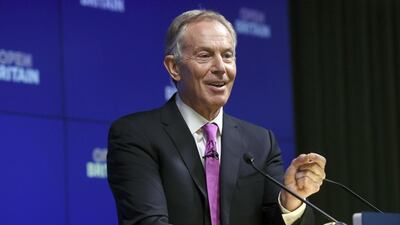Former UK prime minister Tony Blair has faced a good many jibes over the years, but the most cutting of them came near the end of his 10 years in Downing Street. David Cameron, then the new leader of the opposition and eventual prime minister, declared that Mr Blair's fresh face had worn off. “You were the future, once,” he said.
The jibe stuck. Worn down by the terrible course of events in Iraq following the US-led invasion of the country in 2003, which the Blair government was a part of, and under pressure from his ambitious colleague and eventual successor, Gordon Brown, Mr Blair could indeed see the end was on the horizon.
Now, time has finally provided a riposte to Mr Cameron following his own much-criticised decision to call a Brexit referendum in 2016, and it is possible to say that Mr Blair should – perhaps even could – be the future again.
There is a prodigious energy to Mr Blair that only seems to defy time.
The passion he puts into the international issues he is closely identified with remains unsurpassed. During the coronavirus pandemic, he has gained a whole policy reach on global health resilience. Politico, the American news site, recently dubbed him, in a tongue-in-cheek way, as a "wannabe future prime minister". It was a joke, but the writer had a point.
Next week, Mr Blair is scheduled to host a two-way chat with John Kerry, the US special envoy for climate, at the Science Museum in London. It will be a reunion of sorts with Mr Kerry. It will also demonstrate how on behalf of the Tony Blair Institute for Global Change, the former prime minister is still engaged at the highest levels – and an example of the kind of thought leadership that Mr Blair has been exerting for years.
Mr Kerry’s energetic return to the spotlight – he is a former senator, presidential candidate and secretary of state – has shown that there is value in expertise and experience.
Mr Blair has never been away. The former Labour party leader has used his connections to build up a formidable body of work on countering religious extremism, disease and pandemic management as well as technological adaptation. He has also worked on improving governance in some of the poorest states.
The only man to have soundly beaten the ruling Conservative party in three consecutive elections has been a figure of ideas since stepping down in 2007. What has changed is that people are listening anew. There is fresh yearning for the leadership style he offers, one of ideas and reassurance.
There are three forces at work that are now playing to Mr Blair’s strengths.
Throughout the pandemic, the work sponsored by Mr Blair has provided a framework that recognised the gravity of the threat posed by Covid-19 while offering ways to continue to function.
After electoral defeats under far-left leaders, the Labour party is once again grappling for a winning formula. As the focus groups of alienated former supporters gather, a surprising message is coming out. Why, the respondents ask, did the party give up on Mr Blair's reformist, progressive agenda?
Thirdly, as this newspaper highlighted last week, the records from his time in government are starting to come into the public domain. A tranche from 1997 showed that he engaged in a detailed quest within his government to test its policy on Saddam Hussein's rule in Iraq.
A serious charge against Mr Blair has been that he overrode proper process to force the country into the 2003 invasion, which was misconceived and caused immense suffering. In fact, it was the most serious charge. Opposition to the war that ensued and the mishandling of the occupation forced his resignation.
The issue of Northern Ireland is certainly providing a contrast with the current administration of Boris Johnson. Mr Blair’s achievements are being daily undermined by Mr Johnson’s Brexit policy. London is now a divisive player on the Irish situation in its battles with Brussels, most recently seeking to renegotiate parts of its deal with the bloc involving Northern Ireland.
It is unthinkable that Mr Blair’s deep knowledge and hard work can be unpicked, but he himself is very worried. Hardening divisions in Ireland will, however, only bolster his reputation for smart and effective leadership.

Throughout the pandemic, he has spoken earlier than the government on vaccine rollouts, passports for verifying inoculation status and the need to provide global vaccination. His point has always been that nothing is risk-free in a permanent lockdown or during cycles of isolation – and, therefore, that is no way to live.
With the majority of the UK population vaccinated, Mr Blair’s remedies, worked out with think-tank rigour, provide a means to an end. For people seeking sound visions of where to go, Mr Blair is alone in rising above the cacophony of carping by experts.
Mr Johnson starts the third year of his prime ministership today and the country he leads is likely to change rapidly over the next few years. The signature policies from the Blair era, such as 50 per cent of school leavers should go to university for a degree, are no longer fit for purpose. Unfortunately for the Labour opposition, it continues to flounder because, while listening to the calls now for a Blairite approach, it cannot cut through with ideas on how to bring about change. This is also why Mr Blair is more than just a lion in winter continuing to prowl.
Back in the 1990s, the former prime minister had promised a new dawn to the UK. He had used a campaign song titled Things can only get better. It is not beyond reason to see him as the change-maker the country needs once again – not with the same ideas but with the energy to quest for the new, and with the drive to make it happen.


